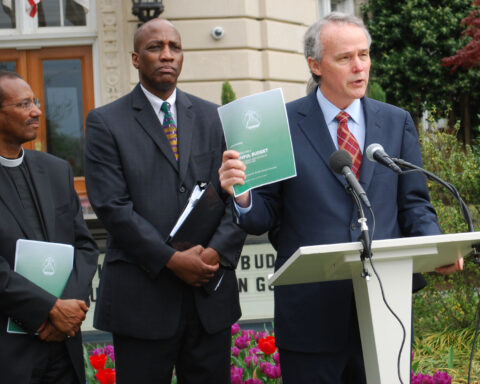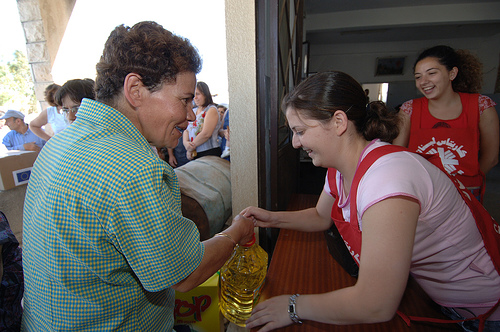[wpcol_1half id=”” class=”” style=””]
Covenant: Sealing the deal[5]
Liberation is only part of the story. Freedom from tyranny was not an end in itself, but a step toward their true identity as the people of God. They were liberated not in order to become self-interested individuals, but in order to bind themselves to God and one another. The covenant at Sinai, marked by consent to promises of mutual responsibility, established the relationships that created the people of Israel, symbolically represented by the Ten Commandments (Ex. 20:1-17; Dt. 5:6-21).
Several features of the covenant are worth mentioning. First, it opens with a prologue: “I am the Lord your God, who brought you out of the land of Egypt, out of the house of slavery” (Ex. 20:2). The covenant takes place within a relationship that has already begun, through the gracious initiative of God. The justification for the covenant is not instrumental or conditional. God acts on their behalf, doing good for them before asking for anything in return.
Second, the stipulations of the covenant are non-negotiable. Once the commandments were presented to them, the Hebrews were not invited to make a counter-offer that more closely suited their personal preferences or individual interests. YHWH remains the sovereign; by consenting to the covenant the people of Israel simply acknowledged God’s rightful reign and their own willingness to conform themselves gratefully and wholeheartedly to God’s rule.
Third, in this covenant, the people are not only bound to God but also to one another. The first four commandments describe the people’s religious obligations toward God and the remaining six describe their social obligations to one another. God demands sovereignty not only in the religious sphere but also over their whole lives and every relationship. A significant number of these commands, moreover, have to do directly with the economic sphere: “You shall not steal,” “You shall not bear false witness,” and “You shall not covet.”
Fourth, the stipulations of this covenant are not arbitrary commands of a powerful sovereign merely flexing his muscles and proving his power. They designate a social order of a particular sort that suits the particular character and ultimate purposes of God. In both Exodus and Deuteronomy, the commands are associated with God’s gracious intention to bless the people. The fifth commandment, “Honor, your mother and father,” offers a brief commentary on its purpose: “so that your days may be long in the land that the Lord your God is giving you” (Ex 20:12; Dt. 5:16). Deuteronomy places all of the commandments and the whole covenant within the context of this fundamental purpose.
[/wpcol_1half] [wpcol_1half_end id=”” class=”” style=””]
Moses exhorts the people to obey all the commandments, “so that it may go well with you and so that you may multiply greatly in a land flowing with milk and honey” (Dt. 6:3). God’s covenant with Israel is not for God’s sake, but for the sake of the people. Unlike Pharaoh and the other sovereigns of the age, God was not trying to wring blessings from the people. God offered blessings to them.
As a model of human existence in relationship to God and one another, covenant offers a rich alternative to organic and individualistic models of society. Organic models tend to interpret people as embedded in natural relationships of dependence and interdependence that give priority to the common good of the whole and place authority in hierarchical structures. In the modern period, an alternative model, based upon contract, has come to the fore to counter the organic model and its abuses. It has tended to understand people as autonomous individuals for whom relationships with one another are voluntary, limited, and temporary. The point of these relationships, moreover, is not the common good, but self-interest. There is no fundamental unity, or shared purpose, or common good, just various people in a temporary relationship of cooperation for the sake of mutual self-interest.
Covenant is distinct from both of these models while sharing some aspects of each. In covenant, the people are not passively subsumed into an organic whole: they are invited into full participation in the common life. Each person is recognized as an equal partner to the covenant, responsible to do his or her part to maintain it. The source of their unity is not ethnic homogeneity but the promises they make to God and one another. In a sense, then, covenant recognizes individual dignity, freedom, and agency in a way similar to the individualistic model. But the covenant is neither negotiated, as we have seen, nor based upon instrumental self-interest.
The covenant at Sinai recognizes human beings as dependent, independent, and interdependent. The people of Israel are dependent upon God for their liberation from slavery, for their survival in the wilderness, and for the social order that sustains them and promotes their flourishing in the Promised Land. But they are also recognized as independent. Their relationship to God and one another is based on a voluntary act of will and continuing fidelity to the promises made. They are not cogs in a machine or organs in a body but persons in relationship. Finally, they are interdependent. They are bound together. Their mutual flourishing depends upon their faithfulness to one another.
[/wpcol_1half_end]





Unbound Social